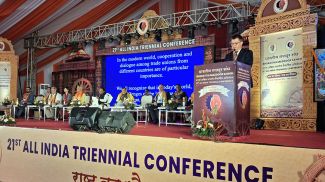MINSK, 27 May (BelTA) – Belarusian journalism should work in the interests of the society and the state, Information Minister Vladimir Pertsov said during the maiden edition of the Forum of the Media Community of Belarus “Media in the Age of Digitalization”, BelTA has learned.
“Mass media are the most important factor shaping and reflecting political, social and economic realities. As the president noted in his speech at the parliament yesterday, Belarus is no longer facing an information war, but a hybrid war. We should do everything to prevent real hostilities. We are at the forefront, and a lot depends on us, journalists. Today mass media play a crucial role in shaping values and attitudes, mass media have an impact on the public sentiment and attitudes towards certain events. In these conditions, impartial and responsible journalism is important like never before, as it brings people together, effectively resists attempts to drive a wedge and split the society. In this sense, Belarusian journalism, regardless of ideological positions and forms of ownership should pursue the interests of the state. In other words, it should benefit the society and the state as a whole,” the minister said.
The minister noted that over the past few years, the Belarusian media space changed dramatically. “By the way, the president noted yesterday that some media and journalists showed that they have sharp tongues. They started working on the internet, and they do it well. The president expressed hope that they would keep it up. Indeed, as the national media landscape is undergoing dramatic transformations, the reader and the viewer are moving to a digital environment. However, it no way means that journalism will become a thing of the past. It will stay, though it will slightly change, passing from one environment into another, from traditional printed publications we are used to into an electronic form - websites, social networks, instant messengers. We need to grow our audience, follow the user, and be interesting on all information platforms. Time does not stand still, and we need to learn, which we will do,” the information minister said.
Vladimir Pertsov added that media holdings are being formed in the print media segment; the formats and content of newspapers, as well as the structure and content of Belarusian national and regional TV channels are changing. “Related technologies, tools, formats, methods of handling and transmitting information, distributing it through social networks, messengers, on OTT media services are making substantial progress. However, hardly anyone would argue that global digitalization brings both new opportunities and new threats. The media can both inform and misinform the audience, spread mistrust and fear. The future of the society and our state will largely depend on what position the media will take. Unfortunately, the world around us has not become safer and more fair. In recent years, we have witnessed a number of political upheavals, armed conflicts, even full-scale wars, including information wars. A distinctive feature of all these events was the huge role of the media and ICT,” Vladimir Pertsov said.
The conflicting parties spend enormous efforts and resources to back their decisions through the media. “The way events are covered is often a conscious and consistent policy to create an alternative reality that someone needs. We, too, are facing this today. Our country is under intense political and information pressure. Moreover, for some time there have been real clashes between true Belarusian media and pseudo-reporters pushing their agenda on various news websites, messengers and social networks. In order to be able to respond to challenges and to be competitive, it is necessary to take advantage of the latest technologies, automation, crossmedia journalism, new methods of analyzing information flows, trends, a new paradigm of calculating the total audience. This should be an integral part of the Belarusian media structure. On the other hand, in the pursuit of brevity and technological effectiveness we should not lose journalism as the art of working with words. Today's forum has brought together true professionals. We really appreciate the opportunity to come together, share best practices and learn. We are sincerely glad to see reputable Belarusian and Russian journalists and experts. We value your opinion, your vision, your view of the development of the media, perspectives, forms and methods of work,” the minister said.
The forum has brought together more than 200 representatives of the national and regional media, media experts and participants of the school of young journalists. The plenary session and thematic discussions will focus on the most pressing issues of the development of domestic media, the role and place of state media in ensuring the information security of the country, the best practices of the Belarusian and Russian editorial offices in the era of digitalization.













